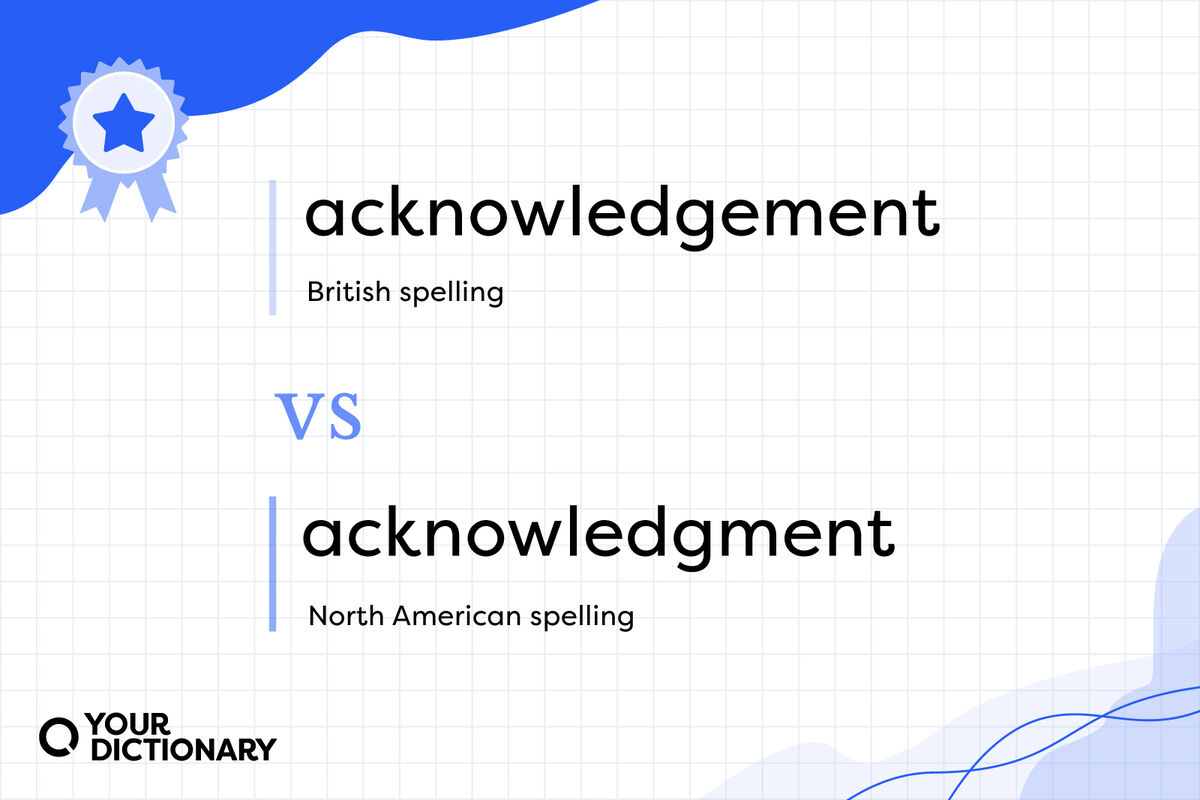
Let’s be honest: Acknowledgement is a headache of a word. It takes an already confusing root word with a silent letter (know), adds two suffixes (ledge and ment), and then adds a prefix (ack) that looks like the sound you make when you swallow peanut butter the wrong way. And to make matters worse, take a look at that “e” in the middle — does it need to be there, or is acknowledgment the right way to spell it?
Spelling and Meaning of “Acknowledgement” or “Acknowledgment”
Both acknowledgement and acknowledgment mean “an acceptance or admission of a fact.” They’re pronounced exactly the same way (ack-naw-ledge-ment). Even the Oxford English Dictionary pairs them together as the same word.
The only difference is their spelling, and that’s based on where you are — or where your audience is.
- acknowledgement (with an “e”) - British spelling
- acknowledgment (no “e”) - North American spelling
Acknowledgement with an “e” is more popular than acknowledgment with no “e” worldwide. And interestingly, it’s also more popular than acknowledgment in the United States — even though the no “e” version is a typically American spelling.
Tips To Remember the Difference Between "Acknowledgement" and "Acknowledgment"
It’s all well and good to determine that acknowledgement is British and acknowledgment is North American, but what happens when you’re writing?
Keep these quick tips in mind the next time you ponder that “e.”
- British spellings usually include extra letters (color vs. colour, canceled vs. cancelled), and the same is true with acknowledgement — so if you’re writing in British English, add the “e.”
- England starts with an “E,” and the British acknowledgement also has an “e.”
Examples of “Acknowledgement” vs. “Acknowledgment”
Still confused about which one to use? Determine whether acknowledgement or acknowledgment looks correct in a sentence. (Hint: That’s the one you should use.)
- Your acknowledgement of my feelings means a lot to me.
- Your acknowledgment of my feelings means a lot to me.
- The politician's public acknowledgement of his crimes surprised everyone.
- The politician's public acknowledgment of his crimes surprised everyone.
- We bought you this gift as an acknowledgement of everything you do.
- We bought you this gift as an acknowledgment of everything you do.
What About Other Parts of Speech?
Even though there are two ways to spell the noun acknowledgement, its verb forms are a lot simpler. It doesn’t matter if you’re writing in Britain or North America — each verb form only has one spelling.
- base verb form - acknowledge
- present participle form - acknowledging (drop the “e”)
- past participle form - acknowledged
Even in the related adjective knowledgeable, there’s only one spelling. Knowledgable is a misspelled word, since it would change the soft “g” sound in knowledge to a hard “g” in gable.
So rest assured — the noun acknowledgement vs. acknowledgment is the only time when you need to choose a spelling option.
The Mystery of the British “E”
So what about that “e”? Why is it there, and why do British writers keep it there (or why do Americans remove it)?
It’s similar to the difference between center and centre — it’s just how English evolved in different cultures. British spelling rules tend to keep the silent “e” when changing a verb to a different part of speech to make its pronunciation clear.
|
British Spelling |
American Spelling |
|
judgment |
|
|
abridgement |
abridgment |
|
lodgement |
lodgment |
|
likeable |
likable |
|
sizeable |
sizable |
If the American spellings of these words make you cringe, use the “e” versions. Like acknowledgement and acknowledgment, both spellings are permissible in North America (although your spell checker might not always like it). However, if you’re writing in British English, it’s best to avoid the versions without an “e” altogether.